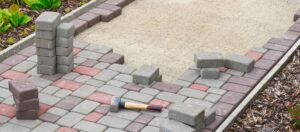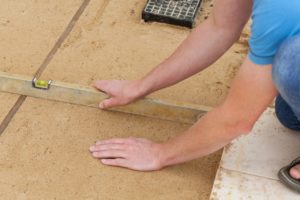Paver patios make a big difference wherever you install them – in addition to being an excellent home investment, they are incredibly durable and beautiful. However, just like any other type of surface, they will always be subject to some kind of dirt or oily stains. Our goal today is to teach you how to clean pavers with bleach – one of the most common ways people clean pavers.
But have you ever asked yourself what the correct way to do this cleaning is?
In this article, you will find all the answers to your questions and more. You will learn how to clean pavers with bleach and how to do it correctly, and most importantly: we will give you valuable tips to make the job easier.
Read also: How Much Does it Cost to Clean and Seal Pavers in 2024?
Jump to:
How To Clean Pavers With Bleach
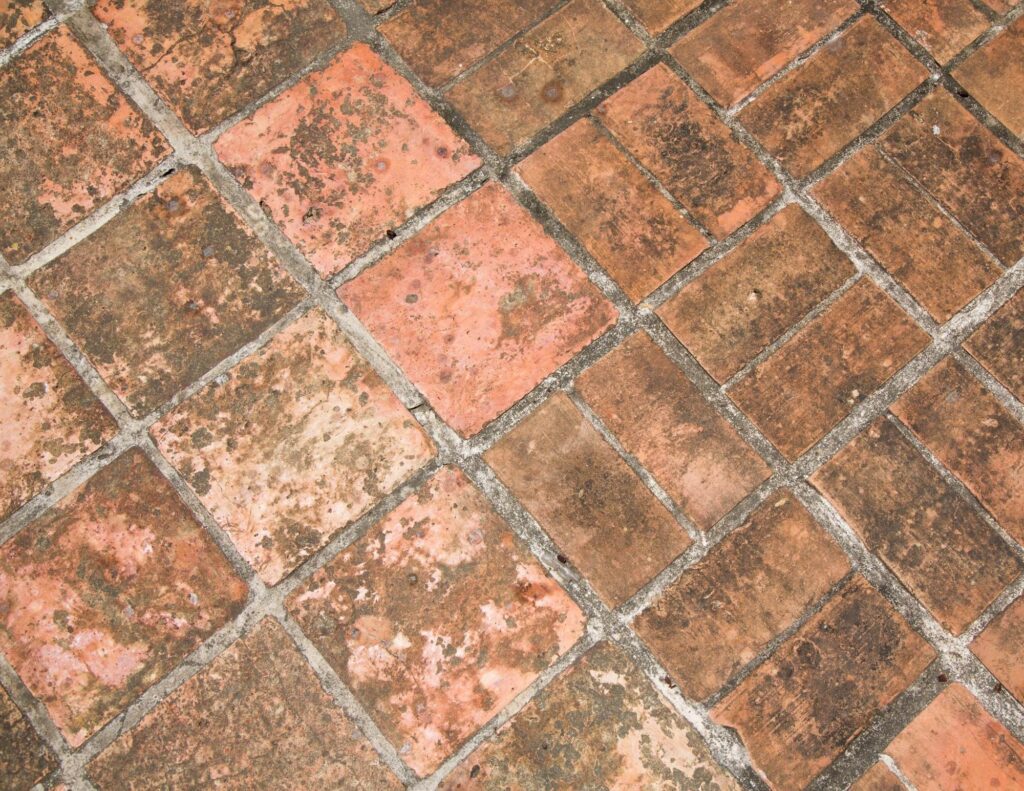
Here is a step-by-step guide on how to clean pavers with bleach:
- Prepare the solution by diluting one part bleach with 10 parts warm water, according to how much product you’re going to need. Add 1 tsp of liquid dish soap for every liter of water. This will help enhance the bleach’s ability to remove tough stains from the pavers and will help rinse away dirt.
- Start by testing the product in a very small area first. If you notice any damage to the pavers, cancel the plan and go for another cleaning method.
- If the test turns out ok, pour the solution into a spray bottle and spray the pavers with the solution until you thoroughly soak them.
- Let the pavers sit in the solution for at least 20 minutes; this will give the solution time to sink into the pores of the pavers.
- Rinse the bleach solution and the dirt off with water from a hose or pressure washer, and allow the pavers to dry completely.
Can I Use Bleach To Clean Any Paving Blocks?
The use of bleach is hugely beneficial for cleaning pavers. The substance not only helps to remove more superficial stains, but also removes moss, algae, and even weeds due to its caustic nature.
One of the most positive aspects of using clean pavers with bleach is that it does not require the use of power washing afterward. Best of all, you can easily find the substance in most homes. Even if you don’t have bleach at home, you can still obtain and buy it at any convenience store.
However, it is essential to state that the use of bleach is not suitable for all types of pavers. To make things easier for you, we decided to list below what are the situations in which we do not indicate the use of the cleaning substance:
- For human-made colored concrete paving slabs or concrete pavers, we don’t recommend the use of bleach for cleaning. That’s because the substance could fade your paver colors if regularly cleaned with bleach over a long period. However, if you don’t mind this, then there will be no problems.
- We don’t recommend you use bleach near areas where there are plants and greenery. The substance is potentially toxic to them and can kill them. Make sure that there are no plants close to the area where you will clean, nor that the water can run off to places close to them. If it’s not possible to avoid this, water the plants well before and after cleaning the pavers with bleach.
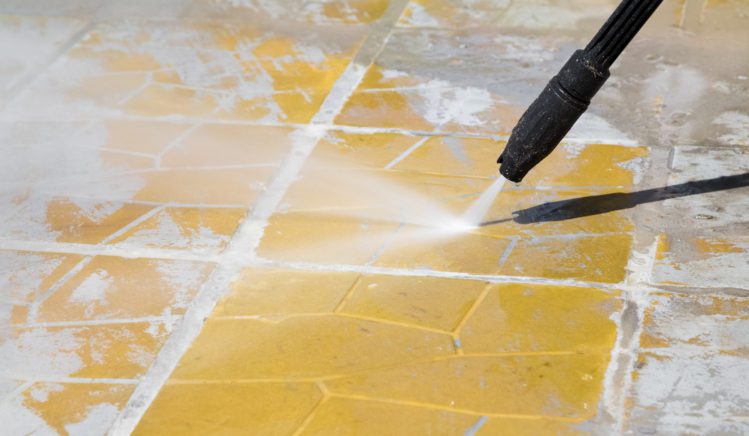
Does Bleach Remove Black Spots On Patio?
Often you may notice black spots appearing on your paver patios. These spots tend to show up more often when you have not properly sealed the pavers or if the sealer has worn off with time.
You will immediately notice that these stains are particularly more resistant than the others. But what exactly are they, and how do you get rid of them?
These black spots are, for the most part, black lichen. Black lichen originates from tiny dust-like spores growing on the underside of leaves on trees and plants. These spores are carried by water and wind, for example, and deposit themselves on the surface of pavers.
The black lichen will feed on the minerals present in the paving stones, and within 2 or 3 years, the first black spots will start to become visible.
As mentioned before, proper and regular sealing helps minimize the appearance of these black spots. But if you eventually forget to follow the paver’s maintenance guidelines and experience this problem, you can use the bleach and water solution to remove the stains.
Using this method to clean pavers with bleach proves to be quite useful for removing black lichen, but always remember to use it sparingly. We will see more about that in the next section.
Read also: How to clean BBQ grease off concrete: 4 efficient methods
Will Bleach Damage Pavers?
As it is a chemical substance, it’s imperative always to adopt safety measures when applying bleach to pavers.
To be more precise, care should start as soon as it is time to dissolve the product in water. We often recommend having a water-to-bleach ratio of 10: 1. Another recommendation is always to avoid thick or clinging bleaches.
What Is The Best Way To Clean Pavers?
There are several ways, substances, and tools you can use to clean pavers. Whether using a pressure washer, bleach, soap, vinegar, or a broom, they all always present a certain degree of risk. It’s also worth mentioning that not everyone has the time or equipment necessary to invest in cleaning pavers.
In many cases, the lack of experience in the process can cause damage not only to the pavers but also to nearby plants.
In situations like this, it is essential to keep some considerations in mind. The first is that, as we mentioned earlier, proper sealing and correct reapplication will protect your pavers from many of the problems covered in this article. But if deep cleaning is necessary, always prefer to hire companies and qualified professionals to do the job.
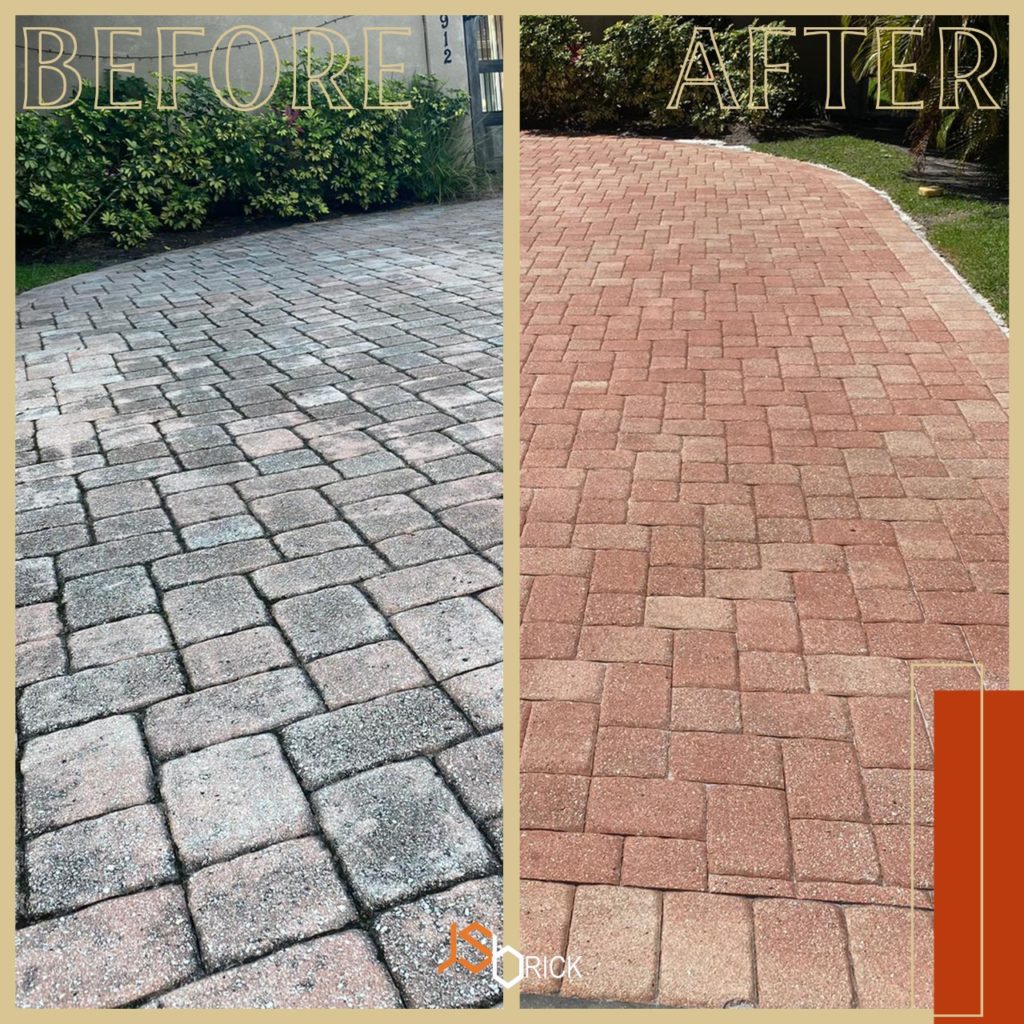
Get Professional Help From Hardscape Experts!
JSBrick has 20+ years of experience providing paver installation, sealing, and cleaning services in Sarasota and surrounding cities. For a free estimate on your paving project, don’t hesitate to leave us a message or call us at your earliest convenience!
FAQ
When not properly diluted, yes. Bleach is a very strong chemical that should be managed carefully at all times. They can do serious damage to your pavers if used without the proper 1:10 dilution ratio.
Cleaners that are pH-neutral are safe to use. One of the safest things you can use to clean pavers is a mixture of warm water and a mild household cleaner.
Yes. Power washing pavers is one of the better ways to clean it, as long as you do it carefully. Start with the lowest possible psi and slowly work your way up. Remember to maintain the nozzle at least 12 inches away at all times.
Yes. Bleach can pretty much clean anything. Simply pour the 1:10 solution onto the stained area, rinsing it with hot water afterward.
Black spots on pavers are usually an indication of bad drainage. Check for infiltrations on buildings around it, the slope of your installation, and the load on the storm drains.

